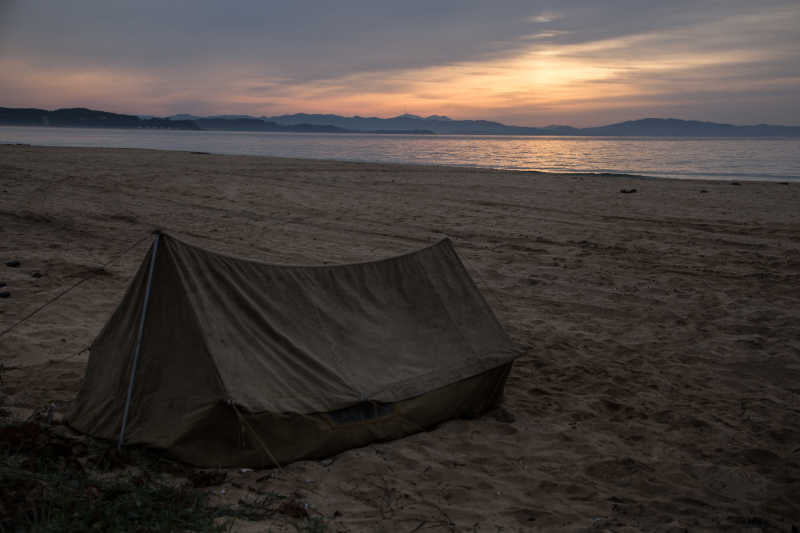
History of 2 Man Military Tents
Today let's talk about the history of 2 man military tents traces back to the evolution of military shelters and camping equipment.

Early History: 2 person military tents have been used for centuries, evolving from simple shelters made of animal skins or fabric draped over poles. These early 2 person military tents were often designed for individual soldiers or small groups and were typically quite basic in design and functionality.

19th Century: During the 19th century, advancements in textiles and manufacturing techniques led to the development of more durable and portable 2 person military tents. These 2 person military tents were used by military forces around the world, particularly during campaigns and expeditions where soldiers needed protection from the elements.

World War I: The First World War saw significant advancements in 2 person military tent design. 2 person military tents became more standardized and were issued to soldiers as part of their equipment. 2 person military tents became common, providing shelter for small units or pairs of soldiers on the battlefield. These 2 person military tents were typically made of canvas and featured a simple A-frame or dome design.

World War II: During the Second World War, the 2 person military tent design continued to evolve. Two-man tents remained a staple of military equipment, providing soldiers with portable and relatively comfortable shelter in the field. 2 person military tents were often made of canvas or other durable fabrics and featured improved designs for better weather resistance and ease of setup.

Post-World War II: After World War II, 2 person military tent designs continued to advance with the introduction of new materials such as nylon and polyester. These materials were lighter and more durable than canvas, making tents easier to transport and set up. Two-man tents remained an essential part of military equipment for armies around the world.

Modern Era: In recent decades, 2 person military tent design has continued to evolve with advancements in materials and technology. 2 person military tents now often incorporate features such as lightweight aluminum poles, waterproof coatings, and modular designs that allow for easy customization and adaptation to different environments and mission requirements.

Overall, 2 person military tents have a long history of evolution and adaptation, providing soldiers with essential shelter and protection in the field during times of conflict and peacekeeping missions.
Many countries around the world utilize 2 person military tents as part of their equipment for various military operations, training exercises, and field deployments.

While it's challenging to provide an exhaustive list of all countries that possess such tents, here are several nations known to have military forces equipped with 2 person military tents:
- United States
- United Kingdom
- Russia
- China
- Germany
- France
- Italy
- Israel
- South Korea
- Sweden
- Canada
- Australia
- Japan
- India
- Brazil
- Turkey
- Pakistan
- Saudi Arabia
- Norway
- Finland
These countries often have established defense industries or procure military equipment from domestic or international suppliers to meet the needs of their armed forces.
The specific models and designs of 2 person military tents used by each country may vary depending on factors such as climate, terrain, mission requirements, and budget considerations.

Ever wondered why it's always 2 person military tents as opposed to 1 person military tents? I'll tell you....
The military buddy system, also known as the "battle buddy" system or "Wingman" concept, is a widely practiced approach in military training and operations. It involves pairing up soldiers or service members to provide mutual support, accountability, and assistance, particularly in challenging or hazardous situations. Here's an overview of the military buddy system:
Purpose: The primary purpose of the buddy system is to enhance safety, effectiveness, and cohesion among military personnel. By assigning each soldier a designated buddy, the military aims to ensure that no individual operates alone and that every service member has someone to watch their back and provide assistance when needed.

Roles and Responsibilities: In the buddy system, each member of the pair is responsible for the well-being and safety of their buddy. This includes tasks such as checking equipment, providing cover during maneuvers, assisting with medical aid if injured, and maintaining communication and situational awareness.

Training and Integration: The buddy system is often integrated into military training programs from basic training onwards. Soldiers are taught the importance of teamwork, trust, and reliance on their buddy, and they practice working together in various scenarios to develop effective communication and coordination skills.

Combat Operations: In combat situations, the buddy system is critical for maintaining unit cohesion and survivability. Soldiers operate in buddy teams during patrols, reconnaissance missions, and other operations, ensuring that they can provide immediate support and cover for each other in case of enemy contact or emergencies.

Physical Fitness and Accountability: The buddy system is also utilized during physical training sessions and fitness exercises. Soldiers may be required to perform exercises or drills with their buddy, encouraging teamwork and motivation while also providing safety supervision.

Emotional Support: Beyond the tactical aspects, the buddy system fosters camaraderie and emotional support among service members. Soldiers often form strong bonds with their buddies, relying on them not only for physical assistance but also for encouragement, morale boost, and friendship during challenging times.

Adaptability: The buddy system is adaptable to various military branches, specialties, and operational environments. Whether on land, at sea, or in the air, soldiers rely on their buddies to navigate complex situations and overcome obstacles together.

Overall, the military buddy system is a fundamental aspect of military culture, emphasizing teamwork, trust, and mutual support among service members. It plays a crucial role in enhancing operational effectiveness and ensuring the well-being of military personnel in training and combat situations.

In conclusion: 2 person military tents serve as essential equipment for armed forces around the world, providing soldiers with portable shelter and protection during field operations, training exercises, and deployments. These tents have evolved significantly over time, from simple canvas shelters to modern, lightweight structures designed for durability, versatility, and ease of use.
The history of 2 person military tents reflects the evolution of military technology and tactics, with advancements in materials, design, and construction techniques improving their functionality and effectiveness in various environments and climates. From ancient civilizations to modern armies, tents have been an integral part of military life, offering soldiers a refuge from the elements and a sense of security on the battlefield.
Key features of 2 person military tents include their compact size, lightweight construction, and ability to withstand harsh weather conditions. They are typically designed for quick assembly and disassembly, allowing for rapid deployment and mobility in the field.
Additionally, modern 2 person military tents often incorporate features such as integrated flooring, ventilation systems, and modular components to enhance comfort and usability for military personnel.
The use of 2 person military tents fosters camaraderie and teamwork among soldiers, as they share living quarters and rely on each other for support during operations.
The buddy system, a fundamental aspect of military culture, is often reinforced through the shared experience of living in close quarters within these tents.
Overall, 2 person military tents play a vital role in supporting the operational readiness and effectiveness of armed forces worldwide, providing soldiers with a secure and comfortable base of operations wherever duty calls.
Whether deployed on combat missions or conducting training exercises, soldiers can depend on their tents to provide a reliable sanctuary in the field.

